“When I grew up the land was for the community”: Oil troubles in Turkana
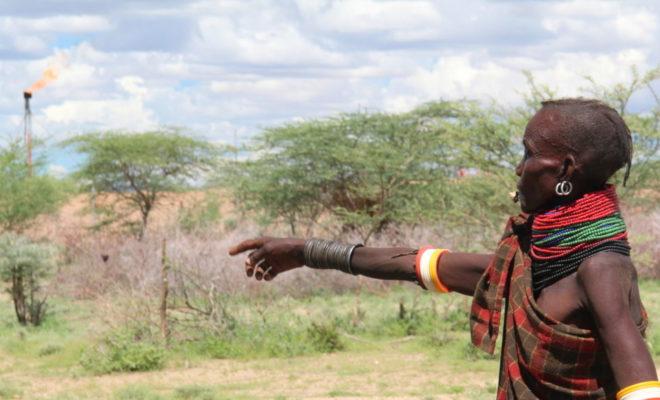
Huge oil discoveries in Kenya’s poorest county have so far brought more frustration and tensions than hope.
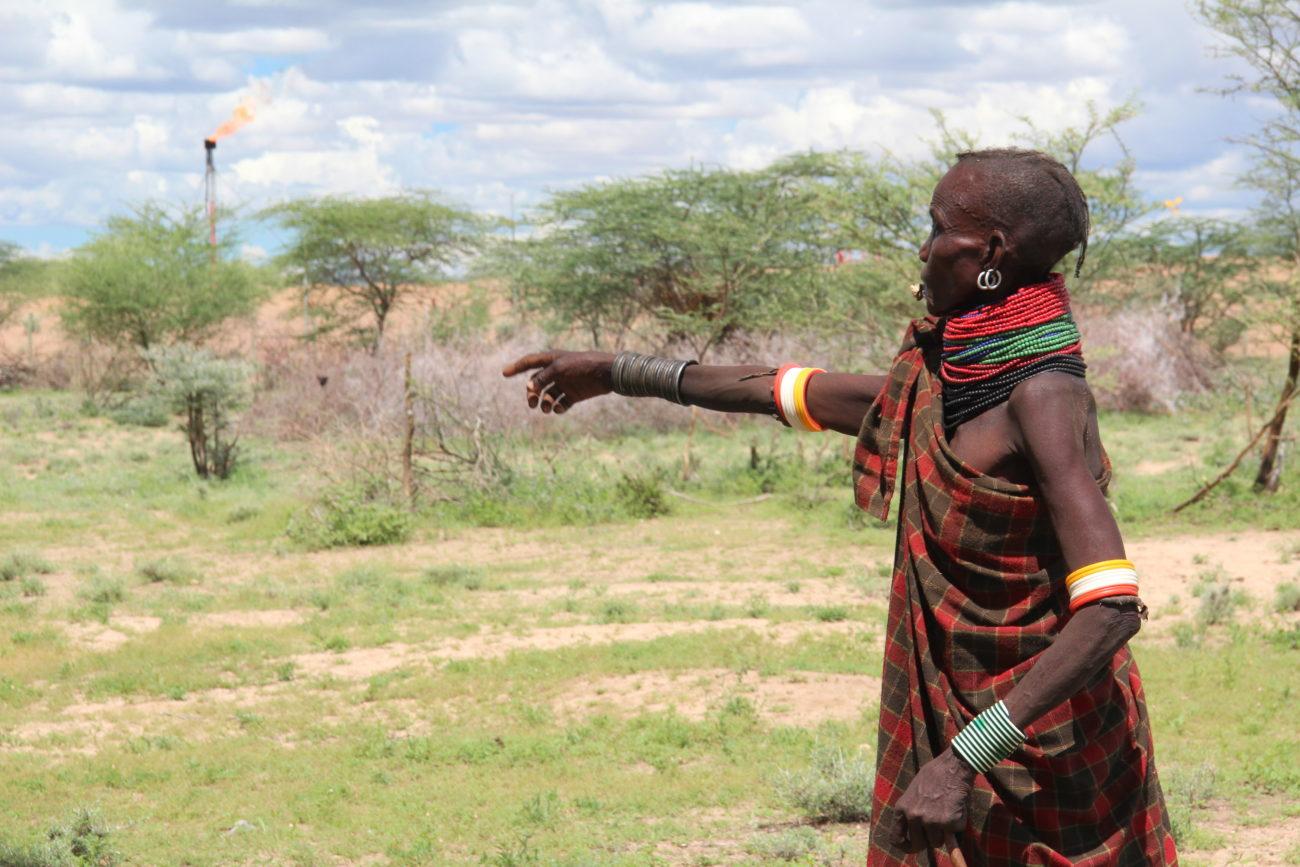
A woman herder in Nakukulas, Turkana county, with a gas flare in the distance. Credit: Nick Young.
This is the third part in a series What does “development” actually look like? The case of LAPSSET looking into the effects of LAPSSET on local communities along its proposed route in: Lamu, Garissa, and Turkana.
On a Sunday afternoon in Lodwar, the capital of Turkana county, a crowd gathers to watch a hoopla game at a muddy crossroads. The spectators, many wearing the blankets and beads of pastoralists, observe as hopefuls try to win a bottle of Fanta or, even better, the big prize: a KSh50 ($0.50) note.
Turkana, located in the far north-west of the country, is the largest and poorest of Kenya’s 47 counties. Since 2013, it has received around $100 million per year from the national exchequer according to a funding formula designed to help marginalised areas catch up. But it remains extremely impoverished.
79% of its nearly one million people are below the national poverty line. A third of the county’s children under five are underweight and a quarter are stunted. Primary school attendance is the lowest in the country, even though free school meals have long been provided, and 82% of adults have no formal education.
Turkana is still hugely underdeveloped, though the county is soon hoping to get a new boost that would eclipse the contributions from central government. First discovered in 2012, it is estimated that there are 750 million recoverable barrels of oil lying under Turkana’s soils. In order to exploit this potential, there are plans to build an 820km export pipeline to Lamu on the coast, along the$25-billion LAPSSET (Lamu Port—South Sudan—Ethiopia) transport corridor.
This could transform the county’s fortunes. But down in Lokichar, the epicentre of Turkana’s oil industry, the boom has so far brought more frustration and conflict than hope. The British company Tullow Oil has opened the oil fields, but many are frustrated that this has not led to more jobs and benefits for those who have lived on the land for generations. Members of the herding community around the village of Nakukulas have barricaded roads in protest.
“Many people working with Tullow are from Nairobi, but they have only given jobs to one or two locals,” says Nakwaan Echwaa. “When I grew up the land was for the community. That is what I knew. God gave us the oil, like the land. Now we hear the government saying it all belongs to them.”
Tullow has tried to earn goodwill by offering $70,000 for each well it drills to committees of residents, who can spend it on public projects of their choosing. As a result, Nakukulas now has a new secondary school and community centre. But people expect more. “We still demand Tullow to build a hospital and drill for water,” says Lowoto Muya who, at 55, is regarded as an elder in the community.
Denis Okore, who leads Kenya field communications for Tullow, argues that these demands have got out of control. “People look to us as if we are the government,” he says. “If someone is bitten by a snake – look for Tullow. Need a road? Go to Tullow. Their appetite for benefits and employment has increased hugely.”
Quarrels over benefits affect not only Tullow but its contractors. Africa Camp Solutions, a Kenyan company that services Tullow’s Lodwar base, agreed to pay a community levy of $5 per night per person sleeping on the site. Wrangles over the management of a committee set up to receive the funds, however, led to angry protests in January.
“He comes back crazy”
Two-thirds of Turkana’s population is made up of pastoralists whose tough, self-contained lives have long been characterised by cattle raiding conflicts with their southern neighbours, the Pokot, and the perennial fear of drought. The arrival of oil has changed people’s lives in a variety of ways.
For instance, livestock has long been the measure of wealth here, but the arrival of large quantities of cash has altered this. “When we came, we established a money system; not deliberately but just by our presence,” says Okore.
According to Ngasike Akuam, a mother of nine, working in oil has also changed some local people’s priorities. “When someone gets a job from Tullow, he comes back crazy, forgets about the family, just running up and down, taking three, four, wives, building houses,” she says.
Andrew Orina, Programs Manager of local NGO, Friends of Lake Turkana, echoes this, arguing that oil has unleashed short term opportunism in disrupted communities. “Everyone is thinking ‘What is in it for me now?’” he says. “There’s no thinking about what it will be like in 15 years.”
Orina suggests that pastoralists have found it difficult to plan ahead in order to ensure the oil boom benefits the area going forwards. “Development is a very loose word,” he says. “It doesn’t necessarily mean much to the local person who has always been more concerned about animals and security.”
Orina mentions a recent community meeting convened to discuss a still unresolved issue: the percentage of oil revenues that will go, respectively, to national government, county governments, and directly affected communities. Whilst many put the case for maximising the local share, one woman simply asked: “What does percent mean?”
Who is benefiting?
Walking around Lokichar, which is still more a straggling village than a town, it is easy to see small businesses thriving from the visitors that oil attracts and local cash it generates. According to Ricardo Lopeyok, Friends of Lake Turkana’s representative here, however, all these places belong to people who work in local government or the County Assembly. People, that is, who know how to calculate percentages, and have steady incomes to invest in sideline businesses.
The biggest show in town, Lopeyok says, is Kapese Contractors, which belongs to local MP James Lomenen Ekomwa. This business has won numerous Tullow contracts for building feeder roads and other facilities.
This dynamic reflects the merging of political and economic elites that is familiar in Kenya more broadly. But District Commissioner for Lokichar sub-county, Alexander Fleming Losikiria, welcomes these investments, which are reversing the usual trend of capital exodus. “There is a multiplier effect,” he says. “Local contractors mean that jobs and money go directly and freely to local people.”
Losikiria adds that “there’s been a very serious awakening to the importance and value of land, which people used to see as just nature, just trees and sand.” In response, however, he notes that the county government has placed a moratorium on sales, pending development of a legal framework, in order to avoid speculative land grabs.
The district commissioner acknowledges the disagreements that have arisen between Tullow and the community, but claims to be mediating these disputes. “The national government just wanted to bring in the police, but our role has been to try and find out what the issues are,” says Losikiria.
He is optimistic they can be resolved. But many locals, whose way of life may be at risk, are not so sure. In the face of elite interests and oil majors, however, Turkana’s pastoralists may struggle to push back, as Nakwaan Echwaa’s weak threat reveals. If the worst comes to the worst, he says, “We can raise up the spirits that are in our soil and make that oil not come out”.


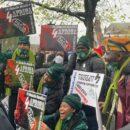
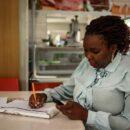
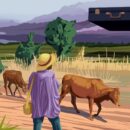


This is a very interesting article that puts development into perspective. Do people really need industrialization and urbanization if they are happy when they live traditionally? Indeed, as Andrew Orina pointed out, development might not mean much to the local people. On the other hand, Kenya is still a developing country. Therefore, they need this oil as a source of revenues for the government and people from Nairobi for example. The government should find an agreement with pastors to exploit some of the land and leave the remaining part to pastors so they may continue their lives as they like it.
I have some questions that were left unanswered by the article. First, when the article mentions that 82% of adults do not have a formal education and 79% of people live under the poverty line, do the numbers include pastors as well? If they do, the numbers might be misleading because pastors do not need a formal education, and they do not use money to measure their wealth. Instead, they measure their wealth in terms of animals. Therefore, the national government might consider them poor while they do not see themselves as such.
Including pastors in those numbers may lead to waste as the national government has been investing $100 million since 2013 for the development of the region. The article mentions that no significant progress is made despite this considerable investment. I assume that progress is measured in terms of the number of people living under the poverty line. However, as long as pastors will continue to measure their wealth in terms of livestock, the numbers might never change. Perhaps the numbers will change as money is becoming increasingly important since the arrival of Tullow Oil. However, Tullow is disrupting the social order as people have been complaining that those who work for Tullow do not keep traditional values such as family.
In addition to the measure of poverty, I am wondering who constitutes the other 1/3 of Turkana’s population (as pastors constitute 2/3). Is the remaining third composed of people willing to accept industrialization and urbanization? Are they the one asking more of Tullow? (Hospitals, drill of water, benefits, and employment). I figure that pastors wouldn’t ask for hospitals because they probably have their traditional medicine.
I would greatly appreciate it if you could answer my questions. I am an independent researcher focusing on international development. I study different development practices and recommend those that I find to be the most effective and efficient.